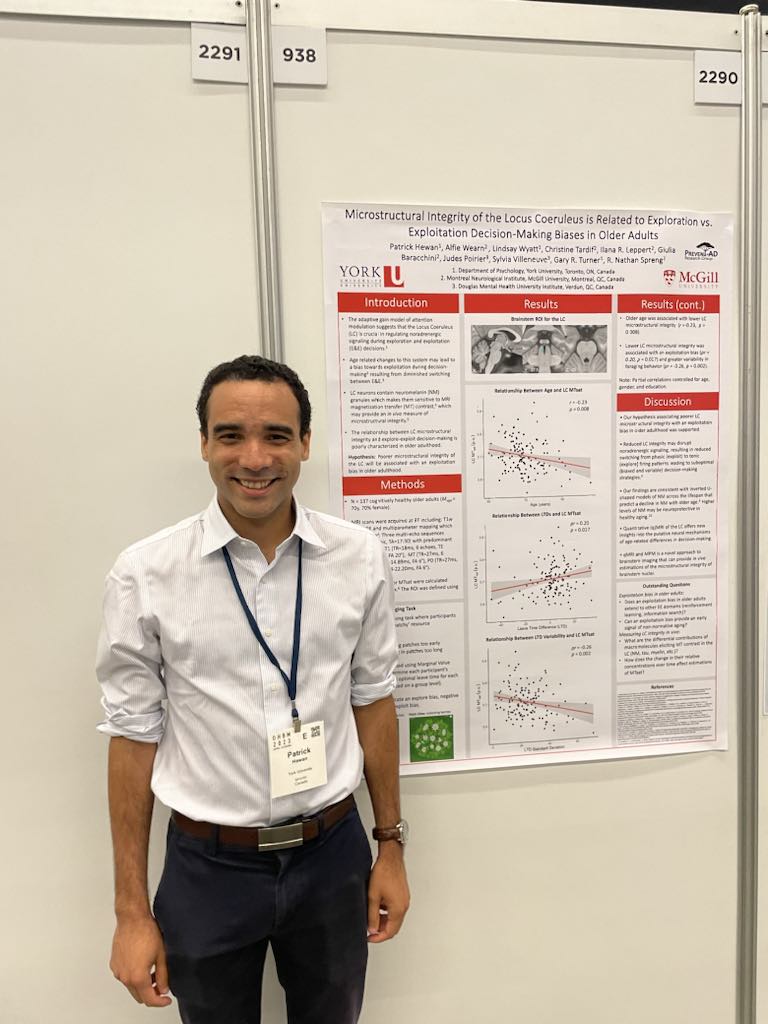On a wintery Saturday, you might find Patrick Hewan playing piano at Carens, a jazz bar in Toronto. During the week, however, you may be surprised to find the accomplished pianist studying cognitive neuropsychology and doing research in Professor Nathan Spreng’s lab at The Neuro. They and others in the lab are exploring decision-making processes in aging adults using MRI and decision-making games. Currently enrolled in the clinical neuropsychology program at York University, Patrick's journey as a researcher begins with a chance encounter.
The intersection of music and neuropsychology
Before delving into the intricacies of aging minds, Patrick wore a different hat—that of a pianist. His earlier years were marked by a profound connection with the piano, influenced by black jazz legends such as Ben Powell and Oscar Peterson. After 10 years as a professional pianist touring the world, it was a stop playing in a palliative care unit that made him realize the profound impact of his music. “These performances were really moving because you could see the change in the patients from the beginning of the performance to the end,” explains Patrick. Seeing this, he decided to embark on a journey going back to high school to complete his science and math course, followed by an undergraduate degree in psychology and now a graduate degree in neuropsychology.
Decoding aging
Within the Nathan Spreng lab, Patrick is actively engaged in trying to understand the intricate interplay of cognitive processes in decision-making. His research explores how decision-making changes with time by looking at how older adults explore new cognitive processes or exploit their pre-existing knowledge and experiences to make decisions. The lab uses decision making paradigms, neuropsychological tests for memory and attention and neuroimaging such as functional MRI to study changes in brain activity. “[Gary Turner] always says that activities that make you break a cognitive sweat, are good for you. That tends to always kind of go hand in hand with exploring and with taking risks and with trying new things. A lot of the brain regions that are involved in exploration also tend to be some of the first to show declines,” Patrick notes. By using a combination of decision-making games and detailed brain scans he is hoping to better understand how decision-making changes during the pre-clinical stages of Alzheimer’s disease.
Patrick is also interested in observing how aging is approached in various cultures. He speaks fondly of his Jamaican grandmother who played a crucial role in her community, bringing food to children in schools.
“I look at my family in Jamaica or my partner's family in Japan. The way aging is dealt with there is almost the flip side of here. There, older adults are incorporated into the community.”
Exploring aging through an intercultural prism can open new avenues for research, he says.
Towards more culturally inclusive research
A recipient of the 2023 CIHR-Brain Canada Personnel Awards for Black Scholars, aimed at increasing the number of highly qualified Black trainees in heart and/or brain research across Canada, Patrick acknowledges the existing gap in research on neurological conditions affecting black communities in Canada and globally. He emphasized the ongoing efforts to bridge this gap but notes that more work still needs to be done.
“When I reflect on Black History Month, that's what I reflect on, almost like radical acceptance of your sort of your circumstances. And then also moving forward and building something. ”

In his research on aging, Hewan highlights the need for more studies and data from regions outside of the Global North, such as the Caribbean and Africa, to understand how people deal with age-related changes in different cultural contexts. He also mentions the challenge of limited samples in neuroscience and psychology research and emphasizes the field's priority to include more diverse samples in their studies. This work will require significant efforts to build trust and he hopes to be part of those efforts to shrink the gap.







